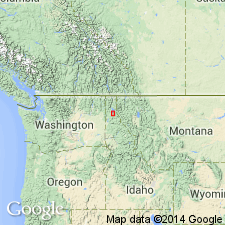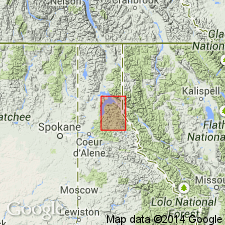
- Usage in publication:
-
- Granite Creek granodiorite*
- Modifications:
-
- Named
- Dominant lithology:
-
- Granodiorite
- AAPG geologic province:
-
- Idaho Mountains province
Summary:
Named as 1 of 3 granodiorite masses in the Pend Oreille district of northern Idaho in the Idaho Mountains province. No type locality designated; named for Granite Creek in Bonner Co, east side Pend Oreille Lake. Consists of a granodiorite of brilliant white color with lustrous black euhedral plates of biotite forming the only conspicuous dark mineral; titanite and allanite occur in abundance. A feature common to all three granodiorites is a type of alteration that had clouded the feldspar and formed abundant chlorite and epidote in all the rocks. The three granodiorites described together since they differ only in detail in their petrography and mineralogy. Intrudes sedimentary rocks of Algonkian and Cambrian age. Is coarse grained up to contact with sedimentary rocks. Geologic maps. Mapped in three small areas on east side of Pend Oreille Lake. Mineral composition tables. Age is "between latest Cretaceous and earliest Eocene."
Source: GNU records (USGS DDS-6; Denver GNULEX).

- Usage in publication:
-
- Granite Creek Granodiorite*
- Modifications:
-
- Overview
- Age modified
- AAPG geologic province:
-
- Idaho Mountains province
Summary:
Mapped as part of a unit designated "granitic to dioritic intrusive rocks" of Cretaceous and Tertiary age exposed along Pend Oreille Lake, Bonner Co, ID, Idaho Mountains province. [This map unit includes rocks named and mapped as Granite Creek, Bayview, and Packsaddle Mountain Granodiorites by Gillson (1927).] Positive aeromagnetic anomalies reflect the exposed and buried Cretaceous granodiorite cupolas and stocks. These granodiorite bodies are associated with the Kaniksu batholith. The early Tertiary event is represented by granodiorite and dacite porphyry dikes that followed the faults. The Tertiary event was the final phase of the Kaniksu batholith. The Cretaceous bodies caused extensive metamorphism of Belt Supergroup and of Cambrian rocks.
Source: GNU records (USGS DDS-6; Denver GNULEX).
For more information, please contact Nancy Stamm, Geologic Names Committee Secretary.
Asterisk (*) indicates published by U.S. Geological Survey authors.
"No current usage" (†) implies that a name has been abandoned or has fallen into disuse. Former usage and, if known, replacement name given in parentheses ( ).
Slash (/) indicates name conflicts with nomenclatural guidelines (CSN, 1933; ACSN, 1961, 1970; NACSN, 1983, 2005, 2021). May be explained within brackets ([ ]).

